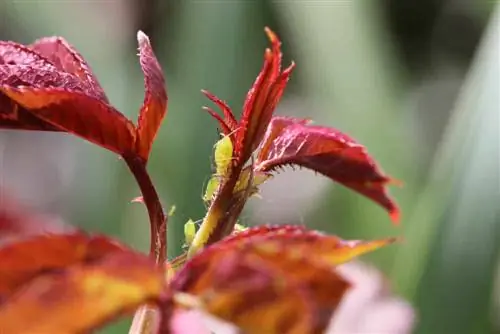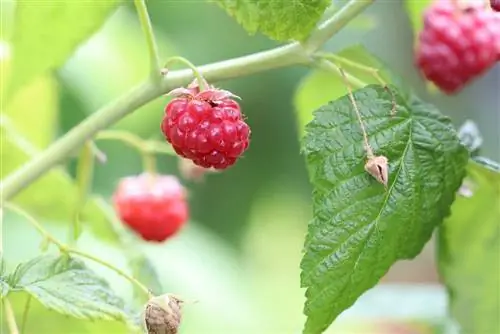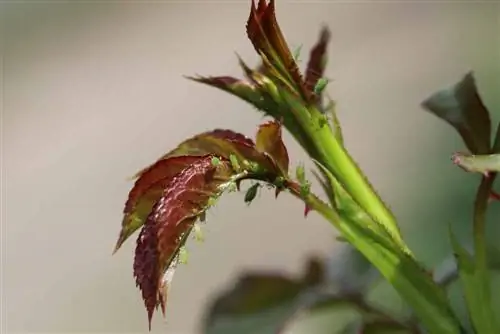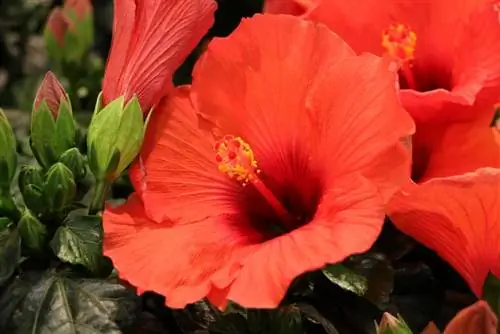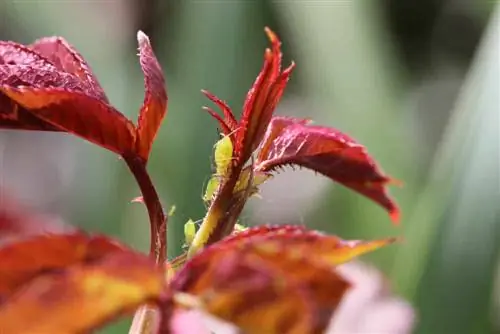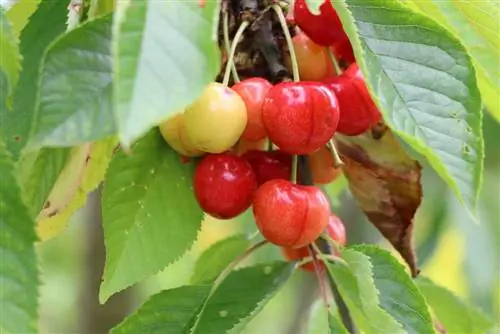- Author admin caroline@plants-knowledge.com.
- Public 2023-12-17 03:39.
- Last modified 2025-01-24 12:45.
Plants are generally hardly safe from aphids and other types of louse. But it's even more unpleasant with herbs because they are used for consumption. Who wants to eat undetected lice? But the damage that lice cause to herbs is also not insignificant. Untreated herb plants die sooner or later. Once one of them is infected with the pests, they quickly spread to neighboring plants and herbs, destroying entire beds. Acting quickly prevents this. Below you will find out what you can do if you have an aphid infestation.
Lice detection
In order to be able to react correctly to a pest infestation, you must first know what pests are involved. In the case of lice or aphids, you can recognize them by their circumference of around two millimeters. Aphids are black or light green in color, other types of aphids are also white or yellowish.
All types of louse usually leave a sticky film on the leaves, stems and sometimes flower buds. Here the expert talks about honeydew.
On herbs, a louse pest infestation can first be recognized by the leaves turning brown before they then become crippled. Buds do not open and fall closed.
Chemical control
When pest control involves edible foods such as herbaceous plants, chemical insecticide treatment is not the best choice. This would not only make the herbs inedible for a long time, but chemical control agents usually also contain substances that are harmful to humans.
Depending on the ingredients, an asthma attack can be triggered.
Typical side effects include headaches, skin irritations and nausea. So-called pyrethroids are even believed to cause disruption of the hormonal system, which could lead to infertility in men. For these reasons, when combating lice on your herbs, you should generally avoid chemical insecticides and instead use natural products and/or home remedies that have already proven to be just as effective in practice.
Poisonless control
For your he alth, for the environment and the herb plants themselves, a non-toxic and natural method of pest control for aphids and all other types of louse is the most recommended.
First Aid
As soon as a lice infestation has been detected, you must act quickly. Here it is advisable to immediately subject the herbs to a shower. The water pressure should be relatively high, but still low enough so that you do not injure any branches or the entire plant.
The water jet removes many of the unwanted pests that suck plant sap. In this way, you can use first aid to prevent major damage.
Plant protection preparations
The gardening retailer offers you a wide range of poison-free organic plant protection products that are also specifically effective against aphids etc.
With plant protection products you also get the advantage that they usually contain other ingredients, which also provide infected herbal plants with nutrients and minerals to gain more strength and energy in order to survive existing damage well and recover quickly to advance. Such organic products are harmless to human he alth and break down naturally, which protects the environment.
Beneficial insects
Beneficial insects are other insects that eat lice as food. These include, for example, ladybirds and their larvae, which are particularly voracious. Depending on the number of larvae, they eat between 400 and 800 aphids per day.
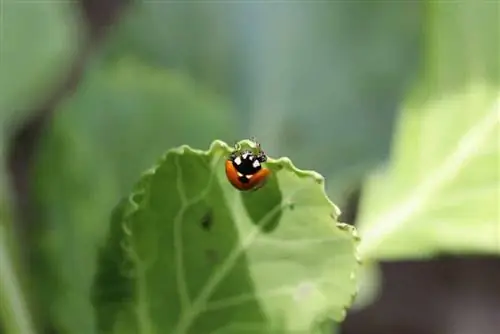
The lacewings are also very hungry for lice, with a daily requirement of between 200 and 500 aphids or scale insects. If there are no beneficial insects in your area, they can be purchased from most organic suppliers. All you have to do is expose them to the herbs.
Tip:
Beneficial insects can be easily attracted using a so-called insect hotel, which they place in the herb bed or herb box.
Home remedies
Before any control method and after showering, remove additional aphids by hand. To do this, simply remove them by pulling the affected parts of the plant between your thumb and forefinger. To be on the safe side, you should also use one of the following treatment options, which can be easily prepared as simple home remedies.
Stinging nettles
- Soak approximately one kilogram of nettles in ten liters of water
- Let it “go” for a day
- Sifting out nettles
- Pour nettle water into a spray bottle and spray herbs with it until they are dripping wet
- Alternatively, wipe plant parts with the nettle water
- Repeat every two days for about a week
- Advantage: Nettles do not affect the edibility of herbs
soft soap
- Dissolve a tablespoon of soft soap in a liter of water
- Only potash soap without additives may be used
- Spirit would increase the effect, but is unsuitable for use with herbs
- Spray herb plant with the lye or rub plant parts individually
- Treatment duration: every other day for at least a week
- Note: Wash herbs thoroughly before use after this treatment
Rapeseed oil
- Mix rapeseed oil with water in a ratio of 3:7 - 30 milliliters of rapeseed oil to 70 milliliters of water
- Use only a plant sprayer
- Pour rapeseed oil mixture and spray specifically on the affected parts of the plant
- Rapeseed oil clogs the respiratory organs of the lice and causes them to die
- Only use freshly prepared
- If there is a severe lice infestation, repeat again after four or five days
- After successful treatment, rinse herbs with pressure water
- If necessary, wipe leaves and stems with household paper to remove residue
Alternative remedies
Wood ash and rock dust are another way to effectively combat aphids on herbs. Simply dust this over the entire herb plant. Wood ash and rock dust are inhaled by the lice and then become lodged in the respiratory organs like a blockage. The pests suffocate.
Caution:
If beneficial insects are used for pest control at the same time or are in close proximity, this method should not be used as their respiratory organs can also be affected.
Prevention
One of the most sensible measures against aphids and their relatives is prevention so that they do not infest the herbs in the first place.
Fertilizer
Especially fertilizer for herbs, often contains nitrogen. This supports the growth of the leaf mass. Too much nitrogen-containing fertilizer or fertilizer types that are too highly concentrated ensure that aphids are attracted. Succulent leaves are a delicacy for them. Use nitrogen fertilizer as minimally as possible and apply it as rarely as possible.
Vegetables/Herbs
The use of onion peels, garlic or other herbs is very effective in preventing aphids.
The suitable types of herbs are simply placed around the plant or worked into the soil. Their scent drives away the lice. Suitable types of herbs are:
- Sage
- Lavender
- Savory
- Thyme
With garlic, use the cloves as a preventive measure by sticking them vertically into the plant pot. The tip should protrude a few millimeters above the earth's surface. There is no smell of garlic spreading throughout the room. But the lice perceive this from a distance and then change direction.
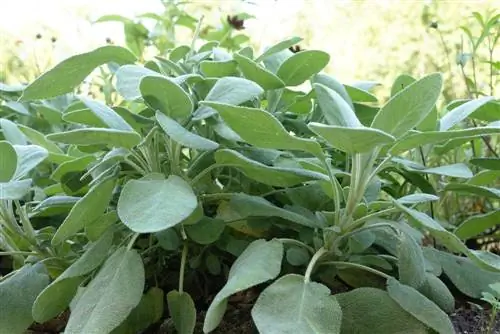
A decoction of garlic or onion peel is suitable as a preventive measure against aphids. To do this, add around two finely chopped garlic cloves or 200 grams of onion peels to around a liter of water and boil them. Then let the brew steep for around an hour. Then sieve out the garlic or onion skins and let the broth cool. Then add this to the water and water your herbs with it. You should use the decoction once a month.
Tip:
The decoction made from onion peels or garlic also works excellently against a lice infestation. In this case, fill the cooled brew into a spray bottle and spray the affected parts of the herb with it for several days in a row.
Conclusion
Aphids and their relatives can cause immense damage to your herbs in the pot in the kitchen, as well as in your herb bed. The chemical club works quickly, but usually has unpleasant side effects for plants, people and animals. Home remedies and biologically natural preparations are more suitable for combating aphids. The examples and methods mentioned are among the most effective and can be used by anyone without any problems.

